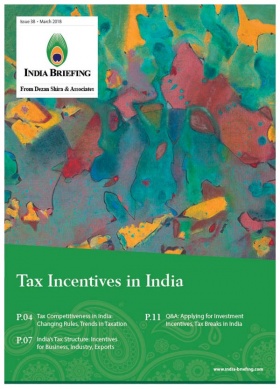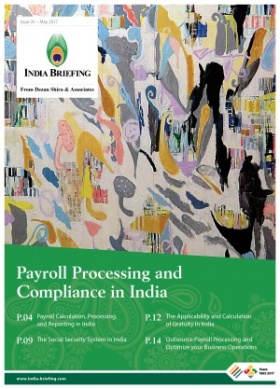Supply Chain in India: On the Brink of a Revolution
Investment into India’s supply chain infrastructure is gaining momentum.
The introduction of the Goods and Services Tax (GST), liberalizing foreign direct investment (FDI) rules, and increased government spending has helped spur growth in the sector.
India’s aspiration to become a global manufacturing powerhouse and the government spotlight on ‘Make in India’ also compels nationwide supply chain reform, prompting several federal and state-based schemes and investment incentives.
In this article, we discuss India’s supply chain ecosystem and emergence of new business opportunities. We also highlight how both government entities and private ventures are seeking to introduce critical efficiencies to transform the state of business as usual.
India’s supply chain network – Growing regional integration, investor confidence
The supply chain industry has a cascading impact on almost all aspects of trade and retail. As India opens its economy further, financing the improvement of this linkage sector is vital for business growth.
A modernized and efficient supply chain improves the ease of doing business, scales down the costs of manufacturing, and accelerates rural and urban consumption growth due to better market access.
Until recently, infrastructural woes had a crippling effect on the supply chain network in India. Suppliers, manufacturers, and retailers had to factor in delays in the movement of goods between state borders due to complicated taxes and transport lines running over capacity, increasing overall costs.
With the new reforms coming into play, a gradual resolution of these problems seems imminent.
In the last three years, India’s supply chain sector has seen an influx of capital, both foreign and domestic. Firms like Future Supply Solutions have raised almost US$2 billion (Rs 130 billion) in investments from domestic and foreign channels.
The French firm, FM Logistics, recently acquired Pune-based Spearhead Logistics, investing over US$8 million (Rs 500 million) with further plans to invest US$46 million (Rs 3 billion) to set up warehouses all over India.
The Delhi-Mumbai Industrial Corridor and Development Corporation (DMICDC) has awarded companies over US$2.3 billion (Rs 150 billion) in contracts for the development of multimodal logistics hubs in Maharashtra, Gujarat, and the National Capital Region (NCR). They are in the process of granting another US$1.5 billion (Rs 102 billion) in contract packages for construction of the same in the states of Uttar Pradesh and Haryana.
The proposed hubs in Maharashtra, Gujarat, and the NCR will provide end-to-end supply chain services, such as small processing facilities (grading and packaging) and final delivery and transport services.
Plans to improve regional connectivity through road, rail, and inland waterways are already ongoing. In fact, India’s 2018 budget saw the highest fiscal allocation for infrastructure spend, at about US$95 billion (Rs 6 trillion).
Below we discuss critical components of India’s supply chain infrastructure as it benefits from planned government spending, easier investment rules, and various tax and fiscal incentives.
Port connectivity in India
India’s ports handle 95 percent of the country’s trade by volume, playing a key role in international supply chains.
India currently permits 100 percent FDI for the construction and maintenance of ports.
The government also allows a tax holiday for 10 years and up to 50 percent financial aid – subject to a maximum of US$3.88 million (Rs 250 million) – for investing companies.
The leading government initiative in this sector is the Sagarmala project, which will modernize existing ports, and will develop new ones at Paradip Outer Harbor (Odhisha state), Cuddalore/Sirkazhi (Tamil Nadustate), Belikeri (Karnataka state), Enayam (Tamil Nadu state), and Vizhinjam (Kerala state).
Cumulatively, these ports will manage almost 100 percent more trade volume by 2025.
The Dubai owned DP World recently signed onto a US$3 billion (Rs 195 billion) joint investment platform with India’s National Investment and Infrastructure Fund to construct several sea as well as river ports, among other logistics projects.
Last mile cargo solutions
Challenges in India’s supply and distribution channels are further complicated by lacking roads and railway infrastructure.
Railway stations are often unable to cope with the large volume of goods transported. Merchandise at railway stations and factories are often left waiting for transport due to delayed turn-around times.
This sector is thus a key focus of government spending and infrastructure investments:
- National highways: The National Highway Authority of India has a bidding process underway for companies to invest in highways across India. Dubai based investment firms have already bid close to US$9 billion (Rs 585 billion) for nine highways. This implies an increase in accountability for the upkeep of these roads – currently extremely under-maintained – and will reduce road travel times.
- Freight corridors: The country’s freight corridors, covering 15 states all over India, are set to be complete by December 2019. Currently, a train carrying cargo travels at the rate of 25 kmph; on these railway lines, trains will be able to reach speeds between 70 and 100 kmph, and will carry double the quantity of cargo.
The project specifications pertaining to quality and efficiency are at par with freight railway lines in Russia, China, and the U.S.
Foreign and local companies are working contractually with the government to finish the first phase of the Eastern Corridor by mid-2018. More freight corridors are planned, and offer good opportunities for large contractual collaborations.
Warehouse development
India allows 100 percent FDI in the development and maintenance of warehousing and storage facilities. Under the Free Trade Warehousing Zone (FTWZ) Scheme, there are several designated zones in India reserved for warehouse development.
Panvel near Mumbai, Khurja near New Delhi, and Siri City in Chennai, are some of the designated FTWZs. The connectivity of these zones with major railways, roads, airways, and ports is well established.
Incentives such as duty free import of building materials and equipment for these zones are attracting investors to this sector. Late last year, the 100 acre FTWZ in Nanguneri in the southern state of Tamil Nadu began operations.
First movers to benefit from supply chain industry reforms
The time is right for first movers to benefit from the changing landscape of India’s supply chain ecosystem.
With greater participation from the private sector and increased government spending, opportunities for foreign investors in the country’s supply chain are on the up. This includes the steady transformation of India’s digital infrastructure as well, with federal campaigns like Digital India working to promote the growth of technology startups and enterprises.
For SME’s, possibilities in third party logistics abound, whether in the transportation of goods, new technology-based improvements to make operations lean, or in warehouse management.
Multinational firms in construction and related industries can also take advantage of investment opportunities in India’s ports, roads, and warehouse development.
Foreign firms with little knowledge of the Indian landscape can benefit from partnerships with established Indian firms in the sector to make it easier to do business in the country.
Koushan Das, Business Intelligence India, Dezan Shira & Associates says, “With the introduction of GST, the logistics sector getting an infrastructure status, and an increase in government spending, the supply chain sector provides significant opportunities for collaboration and private sector investments. Investors and companies will now be able to avail much-needed incentives and remodel their supply chain networks, leading to a more consolidated supply chain ecosystem in the country.”
About Us
India Briefing is produced by Dezan Shira & Associates. The firm assists foreign investors throughout Asia and maintains offices in China, Hong Kong, Indonesia, Singapore, Vietnam, and Russia.
Please contact india@dezshira.com or visit our website at www.dezshira.com.
- Previous Article India’s Solar and Wind Power Industries: Scope for Investors
- Next Article Tax Incentives in India – New Issue of India Briefing Magazine Out Now













